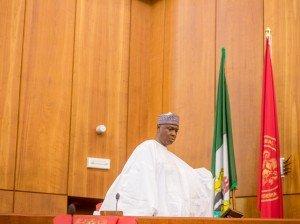


Saraki’s open door policy has changed legislation in Nigeria

Since the inception of Nigeria’s Fourth Republic in 1999, compared to other Assemblies, the 8th Senate stands heads and shoulders above others in many regards.
Senate President, Bukola Saraki, well known for understanding the need to engage the electorate and young people in general via social media, has spread the fever across the Senate, infecting his colleagues.
Using various social media platforms judiciously, Saraki has encouraged and achieved a robust legislature-citizenry interaction and has consequently, driven the roots of Nigeria’s democracy even deeper.
When Saraki took office on June 9, 2015, he pledged to reform the Senate and make its processes more transparent, inclusive and visible.
Since then, he tasked the Committee on Rules and Business to develop an e-Parliamentary system that can be employed at Senate Plenary sessions.
The arrival of the then much anticipated Ministerial list sent by President Muhammadu Buhari was first announced on the Senate’s official social media platform, a move that would have been frowned at in the last dispensation which treated media in any form, like a disease.
Before the just concluded Ministerial screening, the Senate President through his Special Assistant on New Media, Bamikole Omishore, in a statement on October 11, 2015 offered a warm hand of friendship, not just to the media, but even to the citizens.
Omisore announced that Bloggers and news organizations interested in Live Blogging or Live Tweeting, or even those interested in plugging into the livestream of the Ministerial screening were to contact the New Media Office of the Senate President for entry passes to the National Assembly, and the Senate gallery.
Anyone familiar with the National Assembly of old, would know that this is one of the most difficult parts of doing business there – the Pass..
“This screening will create an avenue for Nigerians from all works of life to partake in governance, as the bridge between representatives and constituents will be bridged; with Senators asking questions sourced from Nigerians on Social Media.
“Additionally, the submitted resumes of candidates will be made available in the public space for Nigerians to examine,” Saraki had said.
Nigerians were not left in the dark as Saraki allowed more participation from Nigerians by taking questions from the public via the official handle of the Senate, @NGRsenate.
During the screening, the National Assembly TV station which previously had been left to gather dust was the source of information for different media platforms, which tapped into the feed from the TV station. The Senate’s social media accounts also gave real time updates that served as good material for many Media houses.
The resumes of the nominees were presented to the public before screening to enable those that knew the nominees, raise objections. There was a balance of working to get the President’s nominees passed and at the same time making sure Senate was not a rubber stamp.
A novel innovation was the provision of a sign language interpreter throughout the plenary sessions. Nigerians were able to know virtually all the names of their Ministers and were able to make contributions on social media.
Before Saraki, operations of the National Assembly were shrouded in secrecy.
The Senate’s official Twitter handle was abandoned; the Facebook page moribund and the citizenry knew nothing about legislative activities.
Saraki recently “flung the legislative doors open,” introducing social media networks for citizen participation in the ongoing formulation of the 8th Senate’s legislative agenda.
He encouraged individuals, civil societies and Non-governmental agencies to send in their recommendations in order to achieve what he describes as “a robust and citizens driven legislative agenda.”
He called for input before the final draft of the Legislative Agenda was completed adding that citizen submissions would guide the affairs of the Senate throughout his tenure.
“I enjoin you to forward your contributions to [email protected] including your name, phone number and location,” he said.
Saraki’s open door policy stands in clear contrast to his predecessor David Mark who called for social media censorship in 2012.
“Social media has become a threat to the ethics of media practice and good governance because of its accessibility and absolute freedom. Every freedom carries a responsibility. Even in the advanced democracies, where we all agree that good governance is practiced, there is no absolute freedom,” Mark had said.
Continuing, Mark expressed the belief that “there must be a measure to check the negative tendencies of the social media in our country.
“In the social media a faceless character can post any information that is absolutely false and misleading but will never retract it. At the end of the day one is bombarded with questions over what one has no business with.
“I suggest that schools of Mass Communication and Journalism should review their curricular to include the operations of social media,” Mark submitted.
That the Senate in this dispensation does not frown at giving freely the information requested by the very electorate, who put them in office, is commendable, and should be maintained.
Indeed, if Saraki was the President of the last Senate, perhaps by now closure would have been achieved with the #OpenNASS campaign.
Source: Vanguard
Share this post
Naijanetwork Forum Statistics
Threads: 15076,
Posts: 18162,
Members: 6774


